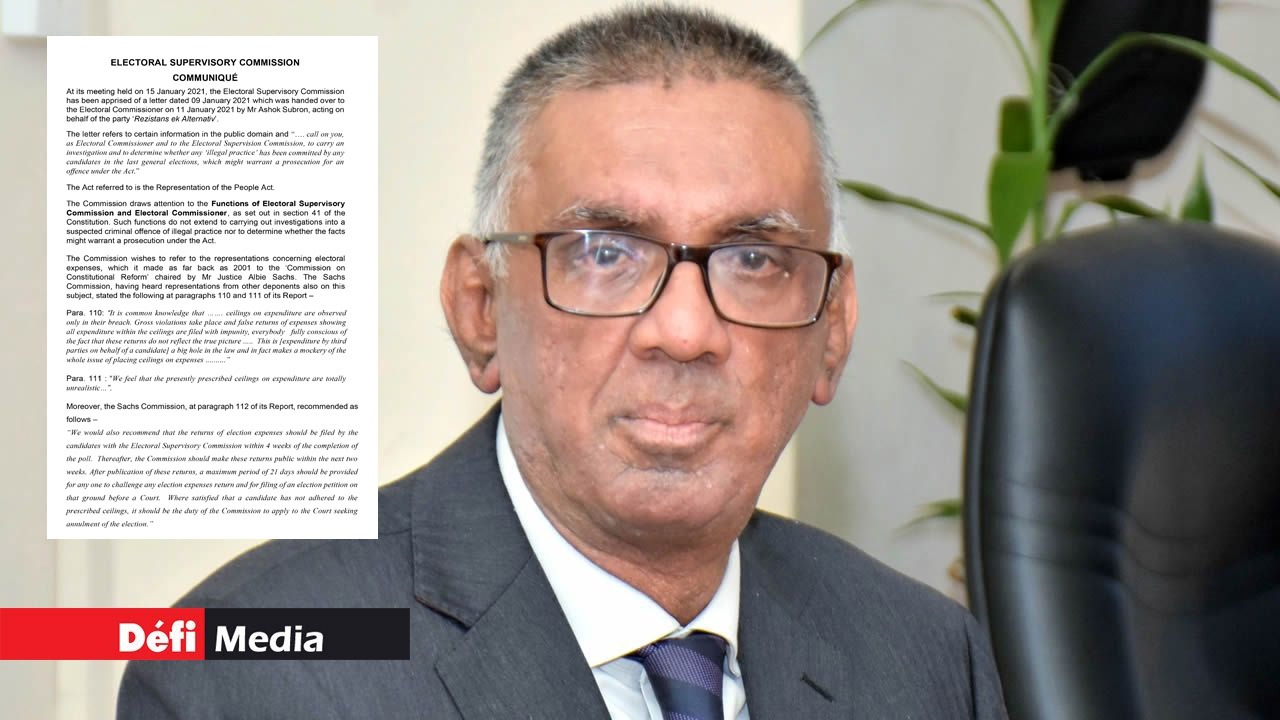
Le Commissaire électoral a pris la décision de référer l'affaire dite des « Kistnen Papers » au Commissaire de Police, ce, après que Rezistans ek Alternativ (REA) a réclamé une enquête de l’Electoral Supervisory Commission (ESC) après la circulation de ces documents.
Dans un communiqué, émis ce vendredi 15 janvier, l'ESC explique qu'elle a été informée de la réponse du commissaire électoral à la lettre de REA, et de la décision du commissaire électoral, Irfan Rahman, de saisir le commissaire de police pour enquêter sur toute suspicion d'infraction électorale.
Le communiqué indique que « la Commission considère que si les informations mentionnées dans la lettre de REA, et tout autre élément de preuve en possession des auteurs de la lettre et qui, à leur avis, ont pu entraîner une violation des dispositions de la « Representation of the People Act » doivent être signalés aux autorités répressives et investigatrices compétentes, comme indiqué dans l'article 9.4 du code de conduite élaboré par la Commission pour les élections générales de 2019 ».
Des représentants de REA ont remis la correspondance au commissaire électoral le 11 janvier, après la circulation des « Kistnen Papers ».
Ce mouvement se réclamant de gauche avait ainsi demandé une enquête de l'ESC.
Ci-dessous le communiqué de l'ESC :
ELECTORAL SUPERVISORY COMMISSION COMMUNIQUÉ
At its meeting held on 15 January 2021, the Electoral Supervisory Commission has been apprised of a letter dated 09 January 2021 which was handed over to the Electoral Commissioner on 11 January 2021 by Mr Ashok Subron, acting on behalf of the party ‘Rezistans ek Alternativ’.
The letter refers to certain information in the public domain and “…. call on you, as Electoral Commissioner and to the Electoral Supervision Commission, to carry an investigation and to determine whether any ‘illegal practice’ has been committed by any candidates in the last general elections, which might warrant a prosecution for an offence under the Act.” The Act referred to is the Representation of the People Act.
The Commission draws attention to the Functions of Electoral Supervisory Commission and Electoral Commissioner, as set out in section 41 of the Constitution. Such functions do not extend to carrying out investigations into a suspected criminal offence of illegal practice nor to determine whether the facts might warrant a prosecution under the Act.
The Commission wishes to refer to the representations concerning electoral expenses, which it made as far back as 2001 to the ‘Commission on Constitutional Reform’ chaired by Mr Justice Albie Sachs. The Sachs Commission, having heard representations from other deponents also on this subject, stated the following at paragraphs 110 and 111 of its Report
– Para. 110: “It is common knowledge that ……. ceilings on expenditure are observed only in their breach. Gross violations take place and false returns of expenses showing all expenditure within the ceilings are filed with impunity, everybody fully conscious of the fact that these returns do not reflect the true picture ..... This is [expenditure by third parties on behalf of a candidate] a big hole in the law and in fact makes a mockery of the whole issue of placing ceilings on expenses ..........”
Para. 111 : “We feel that the presently prescribed ceilings on expenditure are totally unrealistic…”.
Moreover, the Sachs Commission, at paragraph 112 of its Report, recommended as follows – “We would also recommend that the returns of election expenses should be filed by the candidates with the Electoral Supervisory Commission within 4 weeks of the completion of the poll. Thereafter, the Commission should make these returns public within the next two weeks. After publication of these returns, a maximum period of 21 days should be provided for any one to challenge any election expenses return and for filing of an election petition on that ground before a Court. Where satisfied that a candidate has not adhered to the prescribed ceilings, it should be the duty of the Commission to apply to the Court seeking annulment of the election.”
The above recommendations have not been implemented.
The Select Committee on the Funding of Political Parties, in its report dated October 2004, recommended at its paragraph 3.8, as follows – “Revamping the Electoral Supervisory Commission The role of the Electoral Supervisory Commission should be reviewed and strengthened to cater among other things for: (a) receiving and making available for public inspection, disclosable donations, and annual accounts reported to the Electoral Supervisory Commission by registered political parties; (b) investigating the financial affairs of the political parties to ensure compliance with disclosure rules on party funding; and (c) receiving, scrutinizing and investigating accounts of general election expenditure by registered political parties and third parties.” These recommendations have also not been implemented.
The Electoral Supervisory Commission further draws attention to articles 4 and 9 of its Code of Conduct, published in October 2019 for the purposes of the 2019 general elections, which reads as follows – “CAMPAIGN AND ELECTION EXPENSES
4.1 All candidates undertake to keep their election finances and expenses transparent and within the limits provided for by law. 4.2 They shall at all times bear in mind the consequences of not observing the provisions governing the authorized amount of election expenditure, and in particular the criminal sanctions for non-compliance 4.3 They renounce any resort to underhand means to disguise such expenses or to use illegitimate means to obviate or circumvent the relevant provisions of the law.
REPORTING OF BREACHES 9.4
They (all participants to a general election) undertake to report forthwith to the Police any act of illegal payment, bribery, treating, personation, illegal practice, breach of the authorised amount of election expenditure; these acts being prohibited by the Representation of the People Act.”
The Commission considers that, if the information referred to in the letter of Rezistans ek Alternativ, and such other evidence in the possession of the authors of the letter and which, in their opinion, may have resulted in any breach of the provisions of the Representation of the People Act, they may wish to report such matters to the appropriate law enforcement and investigatory authorities, as set out in article 9.4 of the Code of Conduct elaborated by the Commission for the 2019 general elections.
The Commission has been informed of the reply made by the Electoral Commissioner to the letter of ‘Rezistans ek Alternativ’, and of his decision to refer the matter to the Commissioner of Police, for any investigation the latter considers necessary into any suspected electoral offence. The Commission is in agreement with this decision of the Electoral Commissioner.
15 January 2021








